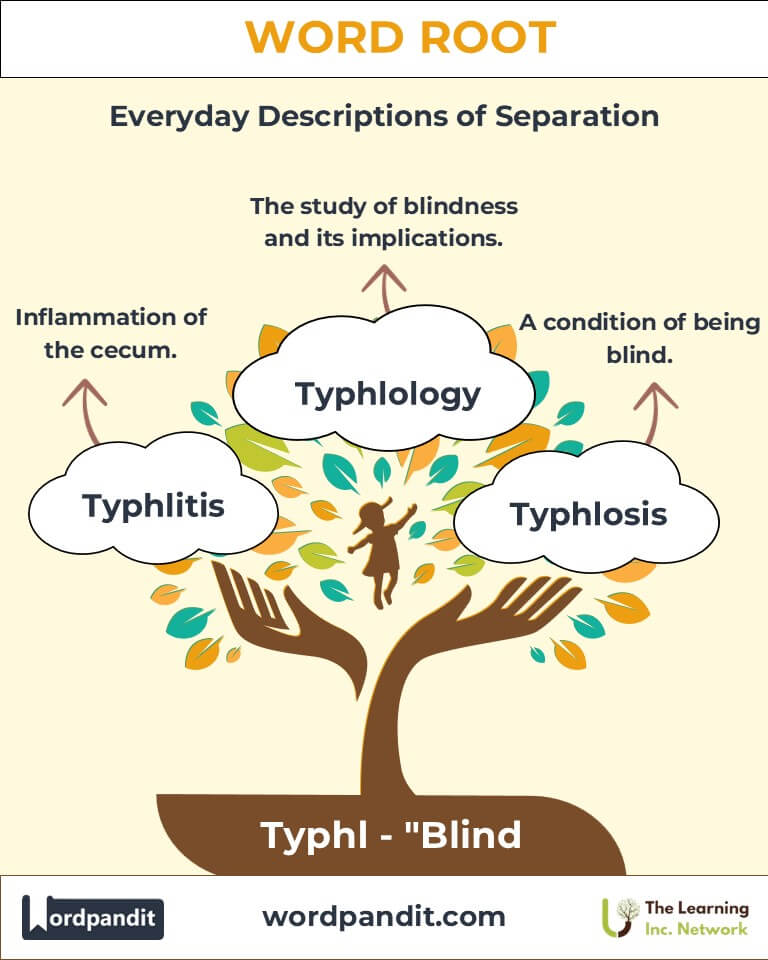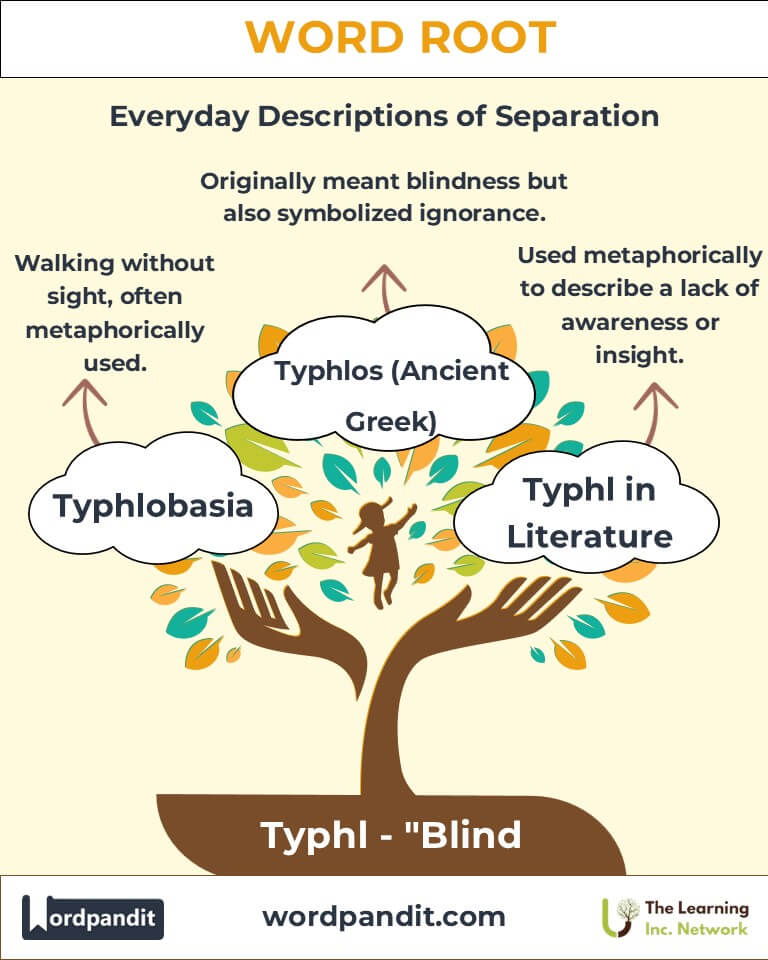Typhl: The Blind Pathway in Language and Medicine
Discover the fascinating journey of the root "typhl," originating from the Greek word for "blind." From medical terminology like "typhlitis" to broader fields of sensory studies, "typhl" unveils the nuances of obscured vision and its metaphorical implications in various disciplines.

Table of Contents
- Introduction: The Essence of Typhl
- Etymology and Historical Journey
- Mnemonic: Unlocking the Power of Typhl
- Common Typhl-Related Terms
- Typhl Through Time
- Typhl in Specialized Fields
- Illustrative Story: Typhl in Action
- Cultural Significance of the Typhl Root
- The Typhl Family Tree
- Conclusion: The Living Legacy of Typhl
Introduction: The Essence of Typhl
What does it mean to see without sight? The word root "typhl" (pronounced "tif-l") comes from the Greek word typhlos, meaning "blind." Its applications extend far beyond literal blindness, encompassing concepts of obscurity and hiddenness. In modern language, it appears in medical contexts, such as typhlitis (inflammation of the cecum) and academic studies like typhlology (the study of blindness).

Etymology and Historical Journey
The root typhl originates from the ancient Greek word typhlos, which directly translates to "blind." In classical Greece, it described both the physical state of blindness and metaphorical blindness, such as ignorance or lack of insight. Over centuries, it found its way into Latin and then into specialized fields like medicine and sensory studies, becoming a cornerstone in understanding visual and metaphorical impairments.
Mnemonic: Unlocking the Power of Typhl
To remember "typhl," imagine a maze with fog obscuring the path ahead, representing blindness or obscurity.
Mnemonic Device:
“Typhl takes you into the fog, where sight and clarity are hidden.”
Common Typhl-Related Terms
- Typhlitis (tif-lie-tis): Inflammation of the cecum.
Example: “Typhlitis is a serious condition often requiring immediate medical attention.” - Typhlology (tif-lol-oh-gee): The study of blindness and its implications.
Example: “The professor specialized in typhlology to advocate for accessible design.” - Typhlosis (tif-loh-sis): A condition of being blind.
Example: “Congenital typhlosis often requires specialized educational resources.” - Typhlobasia (tif-loh-bay-zhuh): Walking without sight, often metaphorically used.
Example: “The novel described life’s uncertainties as a form of typhlobasia.”
Typhl Through Time
- Typhlos (Ancient Greek): Initially referring to physical blindness, it also symbolized ignorance or lack of awareness in philosophical texts.
- Typhlitis (Modern Medicine): This term emerged in the 19th century, reflecting advancements in gastrointestinal studies and diagnostic capabilities.
- Typhlology (Contemporary): As societal awareness about disabilities grew, typhlology became a field dedicated to empowering the visually impaired.
Typhl in Specialized Fields
- Medicine: Typhlitis (inflammation of the cecum) is a critical condition in gastroenterology, often associated with immunocompromised patients.
- Sensory Studies: Typhlology explores the experiences of blindness, advocating for inclusion in design and policy.
- Literature and Philosophy: Metaphorical blindness, often linked to typhl, symbolizes ignorance or the inability to perceive truth in works ranging from ancient Greek tragedies to modern novels.
- In Greek mythology: The blind seer Tiresias symbolizes insight without physical sight.
- In modern times: Typhlology contributes to dismantling misconceptions about blindness, fostering inclusion.
- Opt (Greek: "sight"):
- Optic: Relating to the eye or vision.
Example: “The optic nerve transmits visual information to the brain.”
- Optic: Relating to the eye or vision.
- Scop (Greek: "look"):
- Scope: An instrument for observing.
Example: “The telescope expanded our view of the universe.”
- Scope: An instrument for observing.
- Occlud (Latin: "close, block"):
- Occlusion: Blockage or closing off.
Example: “Dental occlusion studies focus on how teeth align.”
- Occlusion: Blockage or closing off.
Illustrative Story: Typhl in Action
Lila was a researcher in typhlology, driven by her brother’s experience with congenital blindness. One day, while designing a tactile map for the visually impaired, she discovered that her own biases about blindness were clouding her innovation. In collaborating with a blind user, she realized the importance of understanding blindness not as a limitation but as a unique way of perceiving the world. Her breakthrough was hailed as a step forward in inclusive design.
Cultural Significance of the Typhl Root
In many cultures, blindness transcends the physical, symbolizing deeper themes like ignorance or spiritual awakening. For example:

The Typhl Family Tree

FAQs About the Typhl Word Root
Q: What does "typhl" mean?
A: The root "typhl" originates from the Greek word typhlos, meaning "blind." It can refer to both literal blindness and metaphorical blindness, such as ignorance or lack of awareness.
Q: What is typhlology?
A: Typhlology is the study of blindness, focusing on the physical, psychological, and societal aspects of visual impairment. It seeks to improve accessibility, foster understanding, and dismantle misconceptions about blindness.
Q: What does typhlitis refer to?
A: Typhlitis refers to inflammation of the cecum, a pouch located where the small intestine meets the large intestine. It is a serious medical condition, often associated with immunocompromised patients, such as those undergoing chemotherapy.
Q: How is "typhl" used metaphorically?
A: The root is often used metaphorically to describe ignorance or a lack of awareness. For example, in literature, blindness may symbolize an inability to perceive truth or reality, as seen in the Greek myth of Tiresias, the blind seer.
Q: What is typhlosis?
A: Typhlosis is a medical term describing a state of being blind. It is often used clinically to refer to complete loss of vision, whether congenital or acquired.
Test Your Knowledge: Typhl Word Root Quiz
1. What does "typhl" mean?
2. What is typhlology?
3. What does typhlitis affect?
4. How is "typhl" used metaphorically?
5. Which field uses typhlology?
Conclusion: The Living Legacy of Typhl
The root typhl embodies the dual concepts of blindness and clarity, challenging us to think beyond physical sight. From advancing medical care to promoting inclusivity in design, its applications continue to evolve. As we navigate the blurred lines between perception and reality, typhl reminds us that true insight often comes from exploring the unseen.












